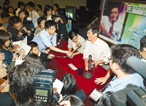Arafat left for Paris, pray for his full recovery!

It's really surprise that Isreali PM Shariel Sharon allowed President Yasser Arafat to receive the treatment in Paris, France. This photo showed the President Arafat greets wellwishers prior to his departure from the West Bank town of Ramallah in this picture released by the Palestinian Authority. Arafat left for Paris, France, to seek urgent medical treatment for a serious illness.
There were reports the Palestinian seems very upset with his departure. Some people even feel lost. Anyway, you can read the report through Washington Post
Henry Siegman, a Middle East analyst at the Council on Foreign Relations in New York also have the same opinion that:
"The importance of Arafat is not in his title as president but his
importance is derived by his image as the incarnation of the national identity
and struggle. Once he's gone, there's no one to replace him. No one can claim to
inherit that mantle."
The ASA hope President Arafat will full recover from his illness. At the same time, the liberation of the Palestinian struggle have to continue. The Palestinian struggle is our struggles. Let's us show our support to them.
Please send your solidarity message to our Palestinian friends.





